In-depth Case Study: HUCL1101 Role Concepts in Health Care Analysis
VerifiedAdded on 2023/06/04
|5
|1187
|261
Case Study
AI Summary
This case study examines Carla's experiences in a healthcare setting, focusing on the unmet needs of love, belonging, and esteem based on Maslow's hierarchy. Carla's lack of social support and workplace challenges led to stress and unhealthy coping mechanisms. The analysis highlights the importance of teamwork, effective time management, and addressing psychological and social stressors to improve mental and physical well-being. The study also explores the impact of unmet basic needs on mental health and decision-making, emphasizing the significance of adequate social support in mitigating risks of depression and promoting overall well-being. Explore this case study and more solved healthcare assignments on Desklib.
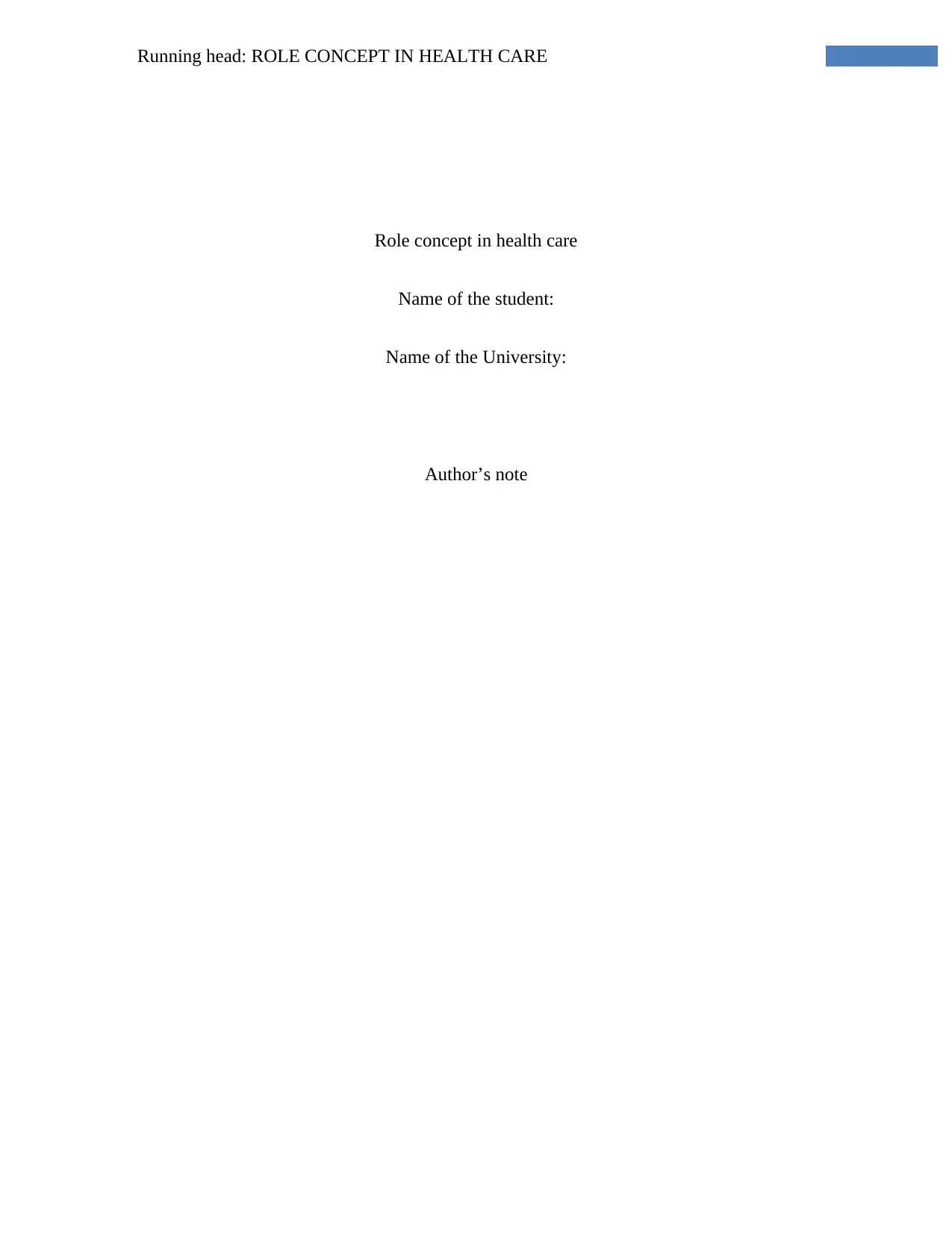
Running head: ROLE CONCEPT IN HEALTH CARE
Role concept in health care
Name of the student:
Name of the University:
Author’s note
Role concept in health care
Name of the student:
Name of the University:
Author’s note
Paraphrase This Document
Need a fresh take? Get an instant paraphrase of this document with our AI Paraphraser
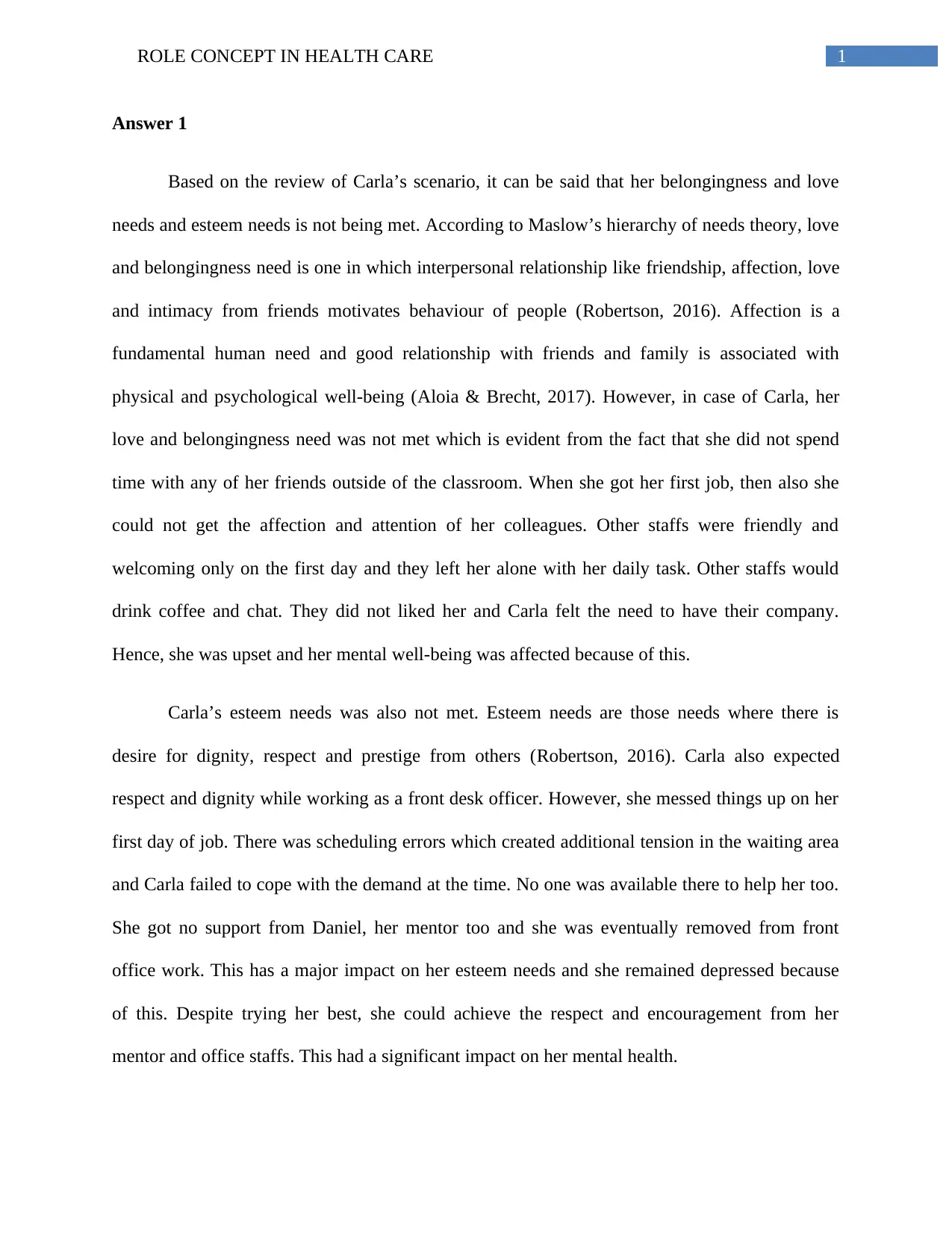
1ROLE CONCEPT IN HEALTH CARE
Answer 1
Based on the review of Carla’s scenario, it can be said that her belongingness and love
needs and esteem needs is not being met. According to Maslow’s hierarchy of needs theory, love
and belongingness need is one in which interpersonal relationship like friendship, affection, love
and intimacy from friends motivates behaviour of people (Robertson, 2016). Affection is a
fundamental human need and good relationship with friends and family is associated with
physical and psychological well-being (Aloia & Brecht, 2017). However, in case of Carla, her
love and belongingness need was not met which is evident from the fact that she did not spend
time with any of her friends outside of the classroom. When she got her first job, then also she
could not get the affection and attention of her colleagues. Other staffs were friendly and
welcoming only on the first day and they left her alone with her daily task. Other staffs would
drink coffee and chat. They did not liked her and Carla felt the need to have their company.
Hence, she was upset and her mental well-being was affected because of this.
Carla’s esteem needs was also not met. Esteem needs are those needs where there is
desire for dignity, respect and prestige from others (Robertson, 2016). Carla also expected
respect and dignity while working as a front desk officer. However, she messed things up on her
first day of job. There was scheduling errors which created additional tension in the waiting area
and Carla failed to cope with the demand at the time. No one was available there to help her too.
She got no support from Daniel, her mentor too and she was eventually removed from front
office work. This has a major impact on her esteem needs and she remained depressed because
of this. Despite trying her best, she could achieve the respect and encouragement from her
mentor and office staffs. This had a significant impact on her mental health.
Answer 1
Based on the review of Carla’s scenario, it can be said that her belongingness and love
needs and esteem needs is not being met. According to Maslow’s hierarchy of needs theory, love
and belongingness need is one in which interpersonal relationship like friendship, affection, love
and intimacy from friends motivates behaviour of people (Robertson, 2016). Affection is a
fundamental human need and good relationship with friends and family is associated with
physical and psychological well-being (Aloia & Brecht, 2017). However, in case of Carla, her
love and belongingness need was not met which is evident from the fact that she did not spend
time with any of her friends outside of the classroom. When she got her first job, then also she
could not get the affection and attention of her colleagues. Other staffs were friendly and
welcoming only on the first day and they left her alone with her daily task. Other staffs would
drink coffee and chat. They did not liked her and Carla felt the need to have their company.
Hence, she was upset and her mental well-being was affected because of this.
Carla’s esteem needs was also not met. Esteem needs are those needs where there is
desire for dignity, respect and prestige from others (Robertson, 2016). Carla also expected
respect and dignity while working as a front desk officer. However, she messed things up on her
first day of job. There was scheduling errors which created additional tension in the waiting area
and Carla failed to cope with the demand at the time. No one was available there to help her too.
She got no support from Daniel, her mentor too and she was eventually removed from front
office work. This has a major impact on her esteem needs and she remained depressed because
of this. Despite trying her best, she could achieve the respect and encouragement from her
mentor and office staffs. This had a significant impact on her mental health.
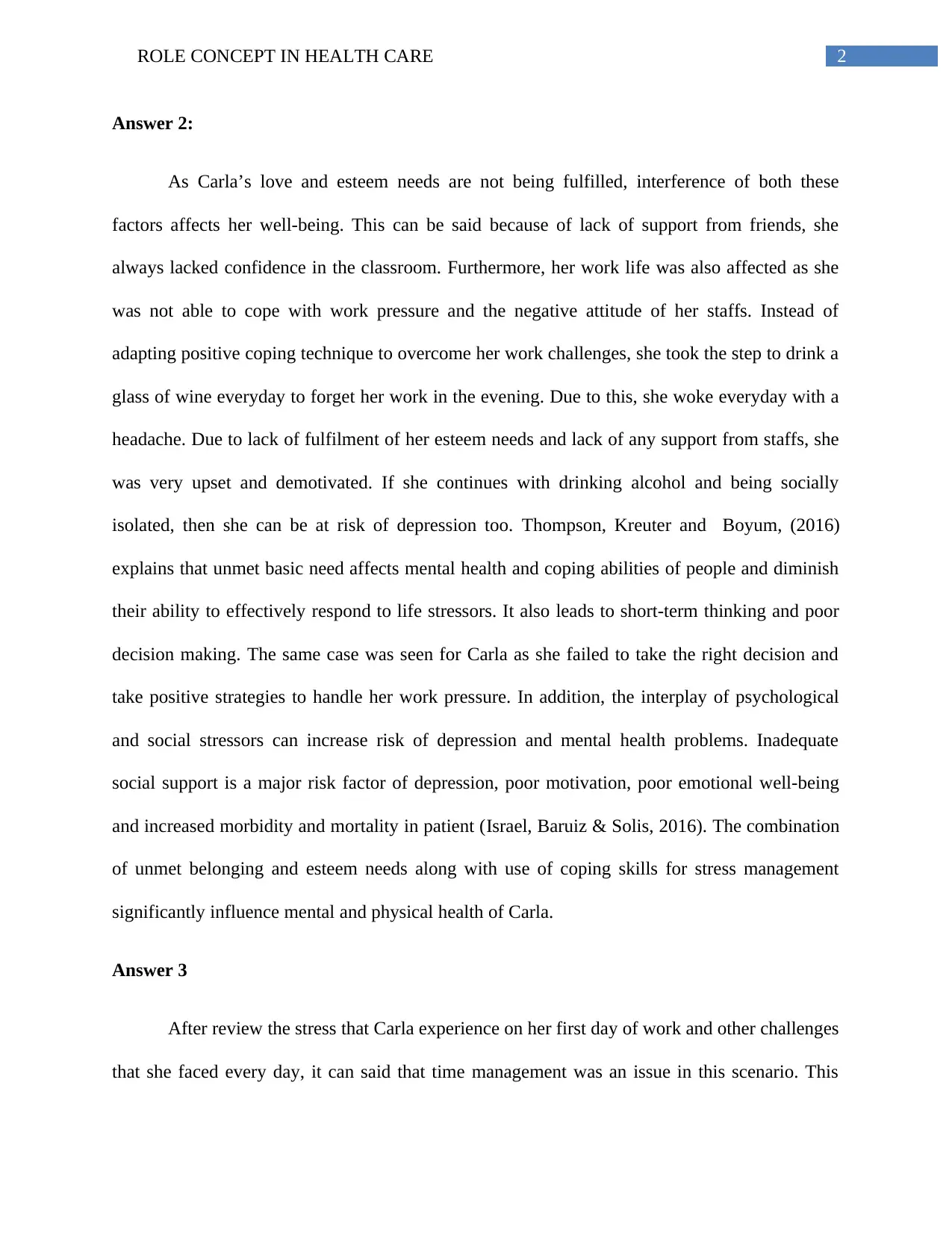
2ROLE CONCEPT IN HEALTH CARE
Answer 2:
As Carla’s love and esteem needs are not being fulfilled, interference of both these
factors affects her well-being. This can be said because of lack of support from friends, she
always lacked confidence in the classroom. Furthermore, her work life was also affected as she
was not able to cope with work pressure and the negative attitude of her staffs. Instead of
adapting positive coping technique to overcome her work challenges, she took the step to drink a
glass of wine everyday to forget her work in the evening. Due to this, she woke everyday with a
headache. Due to lack of fulfilment of her esteem needs and lack of any support from staffs, she
was very upset and demotivated. If she continues with drinking alcohol and being socially
isolated, then she can be at risk of depression too. Thompson, Kreuter and Boyum, (2016)
explains that unmet basic need affects mental health and coping abilities of people and diminish
their ability to effectively respond to life stressors. It also leads to short-term thinking and poor
decision making. The same case was seen for Carla as she failed to take the right decision and
take positive strategies to handle her work pressure. In addition, the interplay of psychological
and social stressors can increase risk of depression and mental health problems. Inadequate
social support is a major risk factor of depression, poor motivation, poor emotional well-being
and increased morbidity and mortality in patient (Israel, Baruiz & Solis, 2016). The combination
of unmet belonging and esteem needs along with use of coping skills for stress management
significantly influence mental and physical health of Carla.
Answer 3
After review the stress that Carla experience on her first day of work and other challenges
that she faced every day, it can said that time management was an issue in this scenario. This
Answer 2:
As Carla’s love and esteem needs are not being fulfilled, interference of both these
factors affects her well-being. This can be said because of lack of support from friends, she
always lacked confidence in the classroom. Furthermore, her work life was also affected as she
was not able to cope with work pressure and the negative attitude of her staffs. Instead of
adapting positive coping technique to overcome her work challenges, she took the step to drink a
glass of wine everyday to forget her work in the evening. Due to this, she woke everyday with a
headache. Due to lack of fulfilment of her esteem needs and lack of any support from staffs, she
was very upset and demotivated. If she continues with drinking alcohol and being socially
isolated, then she can be at risk of depression too. Thompson, Kreuter and Boyum, (2016)
explains that unmet basic need affects mental health and coping abilities of people and diminish
their ability to effectively respond to life stressors. It also leads to short-term thinking and poor
decision making. The same case was seen for Carla as she failed to take the right decision and
take positive strategies to handle her work pressure. In addition, the interplay of psychological
and social stressors can increase risk of depression and mental health problems. Inadequate
social support is a major risk factor of depression, poor motivation, poor emotional well-being
and increased morbidity and mortality in patient (Israel, Baruiz & Solis, 2016). The combination
of unmet belonging and esteem needs along with use of coping skills for stress management
significantly influence mental and physical health of Carla.
Answer 3
After review the stress that Carla experience on her first day of work and other challenges
that she faced every day, it can said that time management was an issue in this scenario. This
⊘ This is a preview!⊘
Do you want full access?
Subscribe today to unlock all pages.

Trusted by 1+ million students worldwide
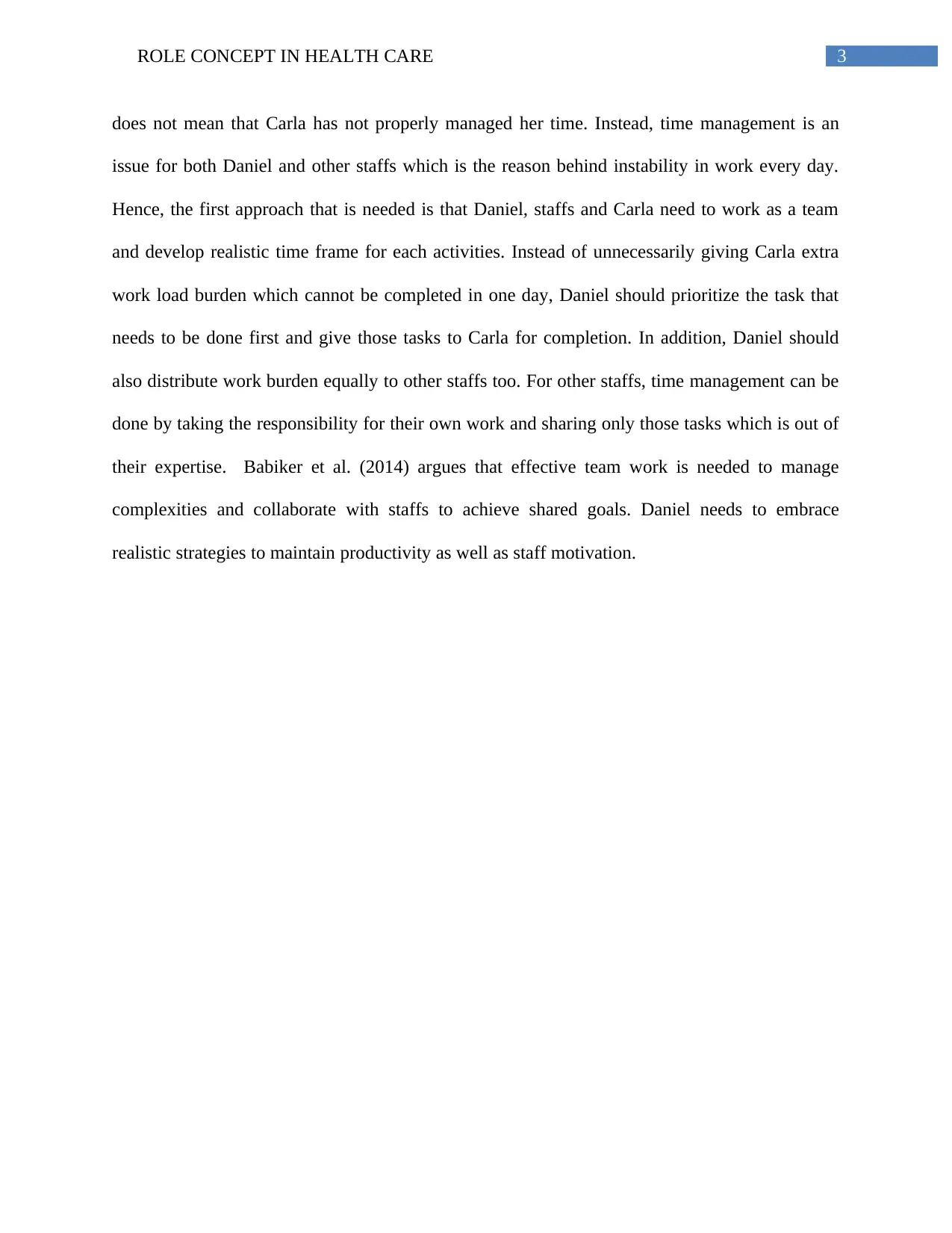
3ROLE CONCEPT IN HEALTH CARE
does not mean that Carla has not properly managed her time. Instead, time management is an
issue for both Daniel and other staffs which is the reason behind instability in work every day.
Hence, the first approach that is needed is that Daniel, staffs and Carla need to work as a team
and develop realistic time frame for each activities. Instead of unnecessarily giving Carla extra
work load burden which cannot be completed in one day, Daniel should prioritize the task that
needs to be done first and give those tasks to Carla for completion. In addition, Daniel should
also distribute work burden equally to other staffs too. For other staffs, time management can be
done by taking the responsibility for their own work and sharing only those tasks which is out of
their expertise. Babiker et al. (2014) argues that effective team work is needed to manage
complexities and collaborate with staffs to achieve shared goals. Daniel needs to embrace
realistic strategies to maintain productivity as well as staff motivation.
does not mean that Carla has not properly managed her time. Instead, time management is an
issue for both Daniel and other staffs which is the reason behind instability in work every day.
Hence, the first approach that is needed is that Daniel, staffs and Carla need to work as a team
and develop realistic time frame for each activities. Instead of unnecessarily giving Carla extra
work load burden which cannot be completed in one day, Daniel should prioritize the task that
needs to be done first and give those tasks to Carla for completion. In addition, Daniel should
also distribute work burden equally to other staffs too. For other staffs, time management can be
done by taking the responsibility for their own work and sharing only those tasks which is out of
their expertise. Babiker et al. (2014) argues that effective team work is needed to manage
complexities and collaborate with staffs to achieve shared goals. Daniel needs to embrace
realistic strategies to maintain productivity as well as staff motivation.
Paraphrase This Document
Need a fresh take? Get an instant paraphrase of this document with our AI Paraphraser
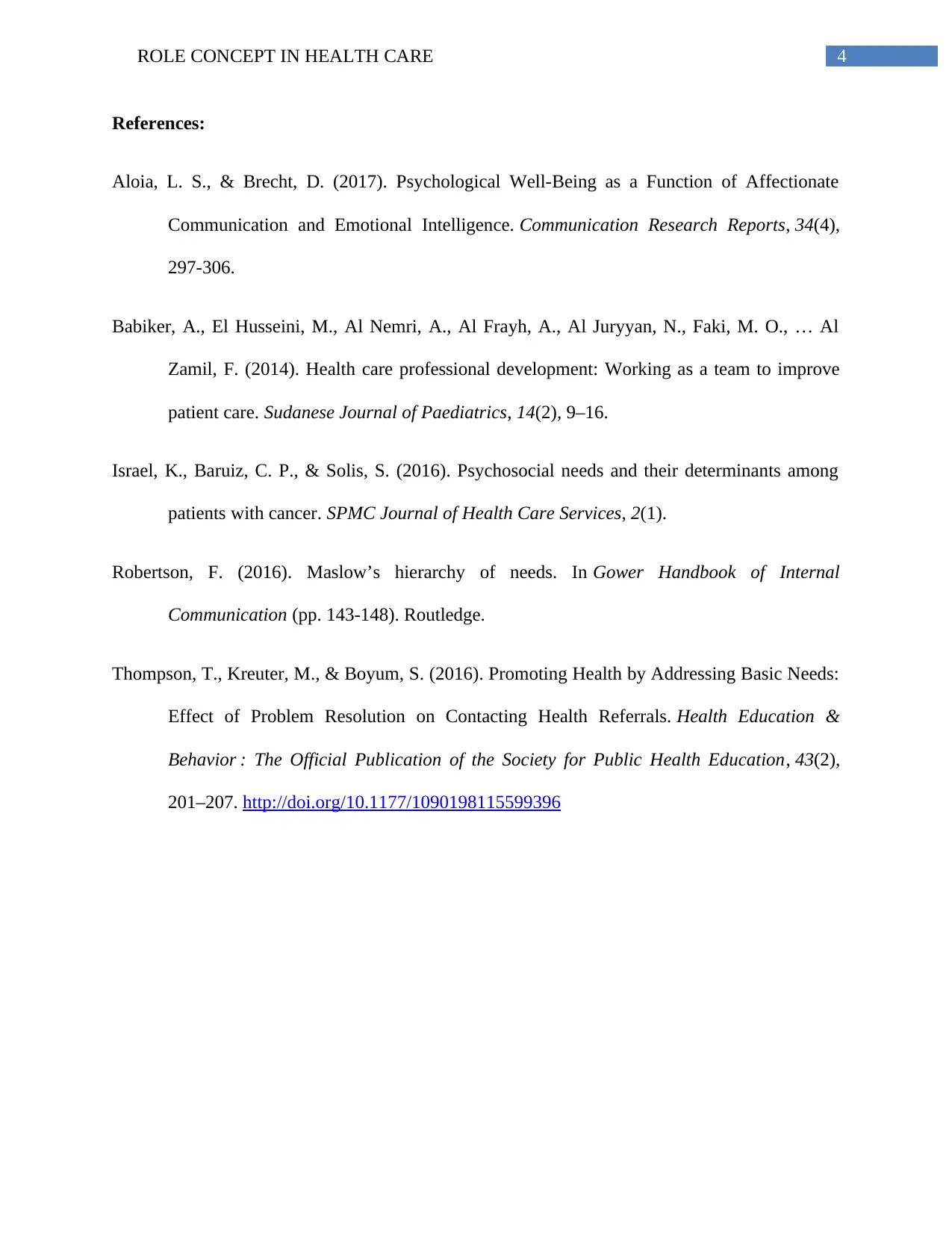
4ROLE CONCEPT IN HEALTH CARE
References:
Aloia, L. S., & Brecht, D. (2017). Psychological Well-Being as a Function of Affectionate
Communication and Emotional Intelligence. Communication Research Reports, 34(4),
297-306.
Babiker, A., El Husseini, M., Al Nemri, A., Al Frayh, A., Al Juryyan, N., Faki, M. O., … Al
Zamil, F. (2014). Health care professional development: Working as a team to improve
patient care. Sudanese Journal of Paediatrics, 14(2), 9–16.
Israel, K., Baruiz, C. P., & Solis, S. (2016). Psychosocial needs and their determinants among
patients with cancer. SPMC Journal of Health Care Services, 2(1).
Robertson, F. (2016). Maslow’s hierarchy of needs. In Gower Handbook of Internal
Communication (pp. 143-148). Routledge.
Thompson, T., Kreuter, M., & Boyum, S. (2016). Promoting Health by Addressing Basic Needs:
Effect of Problem Resolution on Contacting Health Referrals. Health Education &
Behavior : The Official Publication of the Society for Public Health Education, 43(2),
201–207. http://doi.org/10.1177/1090198115599396
References:
Aloia, L. S., & Brecht, D. (2017). Psychological Well-Being as a Function of Affectionate
Communication and Emotional Intelligence. Communication Research Reports, 34(4),
297-306.
Babiker, A., El Husseini, M., Al Nemri, A., Al Frayh, A., Al Juryyan, N., Faki, M. O., … Al
Zamil, F. (2014). Health care professional development: Working as a team to improve
patient care. Sudanese Journal of Paediatrics, 14(2), 9–16.
Israel, K., Baruiz, C. P., & Solis, S. (2016). Psychosocial needs and their determinants among
patients with cancer. SPMC Journal of Health Care Services, 2(1).
Robertson, F. (2016). Maslow’s hierarchy of needs. In Gower Handbook of Internal
Communication (pp. 143-148). Routledge.
Thompson, T., Kreuter, M., & Boyum, S. (2016). Promoting Health by Addressing Basic Needs:
Effect of Problem Resolution on Contacting Health Referrals. Health Education &
Behavior : The Official Publication of the Society for Public Health Education, 43(2),
201–207. http://doi.org/10.1177/1090198115599396
1 out of 5
Related Documents
Your All-in-One AI-Powered Toolkit for Academic Success.
+13062052269
info@desklib.com
Available 24*7 on WhatsApp / Email
![[object Object]](/_next/static/media/star-bottom.7253800d.svg)
Unlock your academic potential
Copyright © 2020–2026 A2Z Services. All Rights Reserved. Developed and managed by ZUCOL.




